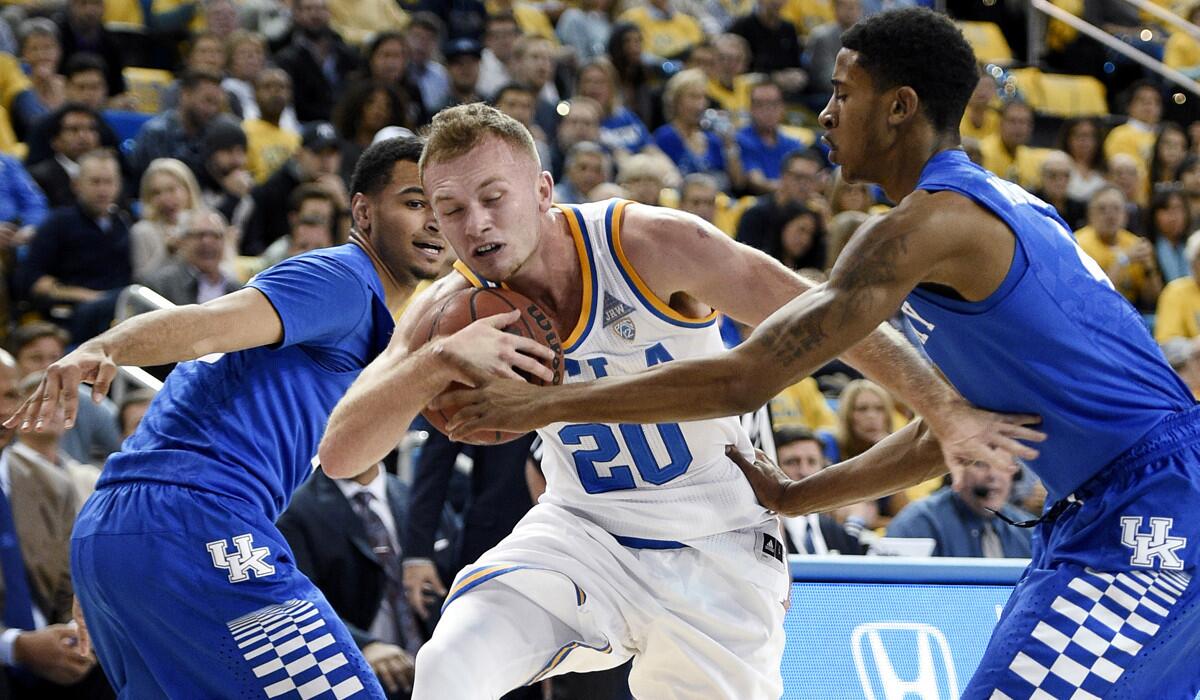UCLA’s nonconference schedule gives them strength, despite some snickers

UCLA guard Bryce Alford, center, attempts to move the ball past Kentucky guard Charles Matthews, right, as Jamal Murray, left, helps defend during the first half of a game on Dec. 3.
- Share via
Reporting From NEW YORK — Since the second game of the season, UCLA assistant coach Duane Broussard has been a marked man.
In their season opener, the Bruins lost to Monmouth. In the second game, they endured a tense, five-point win over Cal Poly, and by the postgame news conference, UCLA Coach Steve Alford was frustrated. The schedule, he said, was too much too soon.
“We’ve got a day off tomorrow,” Alford said. “Maybe I’ll sit and talk with coach Broussard who does our scheduling, because he scheduled way,” he held this last word for emphasis, “over his head right now.”
It became something like a ritual. Given any opportunity, Alford would rib Broussard about the schedule he assembled.
Before the season: “Everybody knows the Kentuckys and the Carolinas,” Alford said. “When you start diving into Pepperdine, all five starters back, Cal Poly, four starters back, Monmouth has a transfer sitting out, and very, very good team. So you start diving into that, and it’s like, ‘OK, Duane.’ ”
After Long Beach State: “We’ve got to look at scheduling and where we put these teams at,” Alford said. “Because I was very concerned about this one.”
After Louisiana-Lafayette: “This is a team that’s picked to win their league, picked to win the Sun Belt, so we just run into a really difficult schedule,” Alford said.
UCLA has played the fourth most difficult schedule among power-conference teams, according to basketball statistician Ken Pomeroy. And it will finish the most demanding five-game stretch of this demanding non-conference schedule Saturday against No. 11 North Carolina.
But something funny has happened. After the early loss to Monmouth, and two losses at the Maui Invitational, UCLA has rolled. It has beaten then-No. 1 Kentucky at home and then-No. 20 Gonzaga on the road.
Broussard admits the schedule was a bit of a gamble. Regardless of Saturday’s outcome, he already has been vindicated.
“Sometimes you have to roll the dice and say, ‘OK, this is how it’s going to have to be, and we’re just going to have to deal with it,’ ” Broussard said. “I think we’ve met the challenge.”
Each head coach adheres to his own philosophy. At Kentucky, Coach John Calipari prefers neutral-site games on national television. At mid-major San Diego State, Coach Steve Fisher likes a mixture of easy games, some challenging ones and a few marquee home-and-home series.
Broussard has been on Alford’s staff for eight seasons, spanning their time at New Mexico, and since they arrived at UCLA, they have scheduled aggressively.
Doing so, they believe, helps them identify weak points before the Pac-12 season. And it can also be a savior in the NCAA tournament selection process.
Last season, UCLA was a bubble team. Its selection was one of the biggest surprises. Alford believes the Bruins’ schedule won the selection committee over.
“We didn’t win any of those games last year,” Alford said. “But even not winning them, because we played them, and we ended up being a team that was kind of on the bubble, if you looked at all those bubble teams, we played a better schedule.”
The scheduling process takes years. This season’s began to take shape in early 2014, when UCLA announced its home-and-home series with Gonzaga and its participation in the Champions Classic, in which it will play North Carolina.
Alford prefers two home-and-home series per season, and before last season began, UCLA had added Kentucky. That left a tournament and what are called “buy games” against mid-majors whom UCLA pays to play.
This is where philosophy matters. Do you begin with cupcakes? How many losses should you risk in the name of improvement?
Broussard tailors his schedule with the Ratings Percentage Index in mind. In the RPI, a tool used by the tournament selection committee, your opponents’ winning percentage is twice as important as your own. And the winning percentage of your opponents’ opponents is actually just as valuable as your own.
From there, it is easy to see why a team such as Monmouth is so desirable: it is talented and experienced, which means it should win a lot of games. And it plays teams such as Notre Dame, Georgetown and Dayton, meaning its own strength of schedule should be strong.
At some point, though, there is a limit.
“Four weeks ago, it’s like, ‘Oh my gosh, did we do the right thing here?’ ” Broussard said. “ ‘Did we schedule too difficult?’ ”
Last season, that question remained open until the NCAA tournament.
Sometimes, though, the answer is clear. Even Alford agrees.
“We want to make sure we’re playing a top-notch schedule,” Alford said. “I think the fans want that, but our players want that.
“I may, you know, snicker about it. But I like it too.”
UCLA UP NEXT
vs. NO. 11 North Carolina
When: 10 a.m. PST Saturday.
Where: Barclays Center, New York
On the air: TV: CBS; Radio: 570.
Update: UCLA (8-3) is in a position to avenge the last of what were, arguably, its three worst losses last season. The Bruins already have wins over Kentucky and Gonzaga. Last season, the Tar Heels gave UCLA a 22-point beatdown at the Battle 4 Atlantis tournament. The Bruins turned the ball over 23 times in that game. North Carolina (8-2) was the preseason No. 1 team but lost to Northern Iowa and then to Texas on a buzzer-beater last week. Marcus Paige, who was injured for the team’s first six games, leads the team with 17.3 points and 4.8 assists per game. The Tar Heels will be playing without talented forward Kennedy Meeks who has a bruised bone in his left knee.
Follow Zach Helfand on Twitter: @zhelfand
More to Read
Go beyond the scoreboard
Get the latest on L.A.'s teams in the daily Sports Report newsletter.
You may occasionally receive promotional content from the Los Angeles Times.







